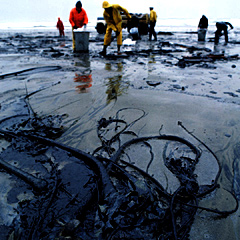 |
Atmospheric Administration |
**__Related stories:__***linkurl:Fido's fur to heal Gulf Coast;http://www.the-scientist.com/community/posts/list/994.page
[10th May 2010]*linkurl:Nature's Response To Man-Made Pollution Needs More Man-Made Funding Support;http://www.the-scientist.com/article/display/10171/
[25th June 1990]*linkurl:Oil Spill Spawns Alaskan 'Science Rush';http://www.the-scientist.com/article/display/9385/
[12th June 1989]














